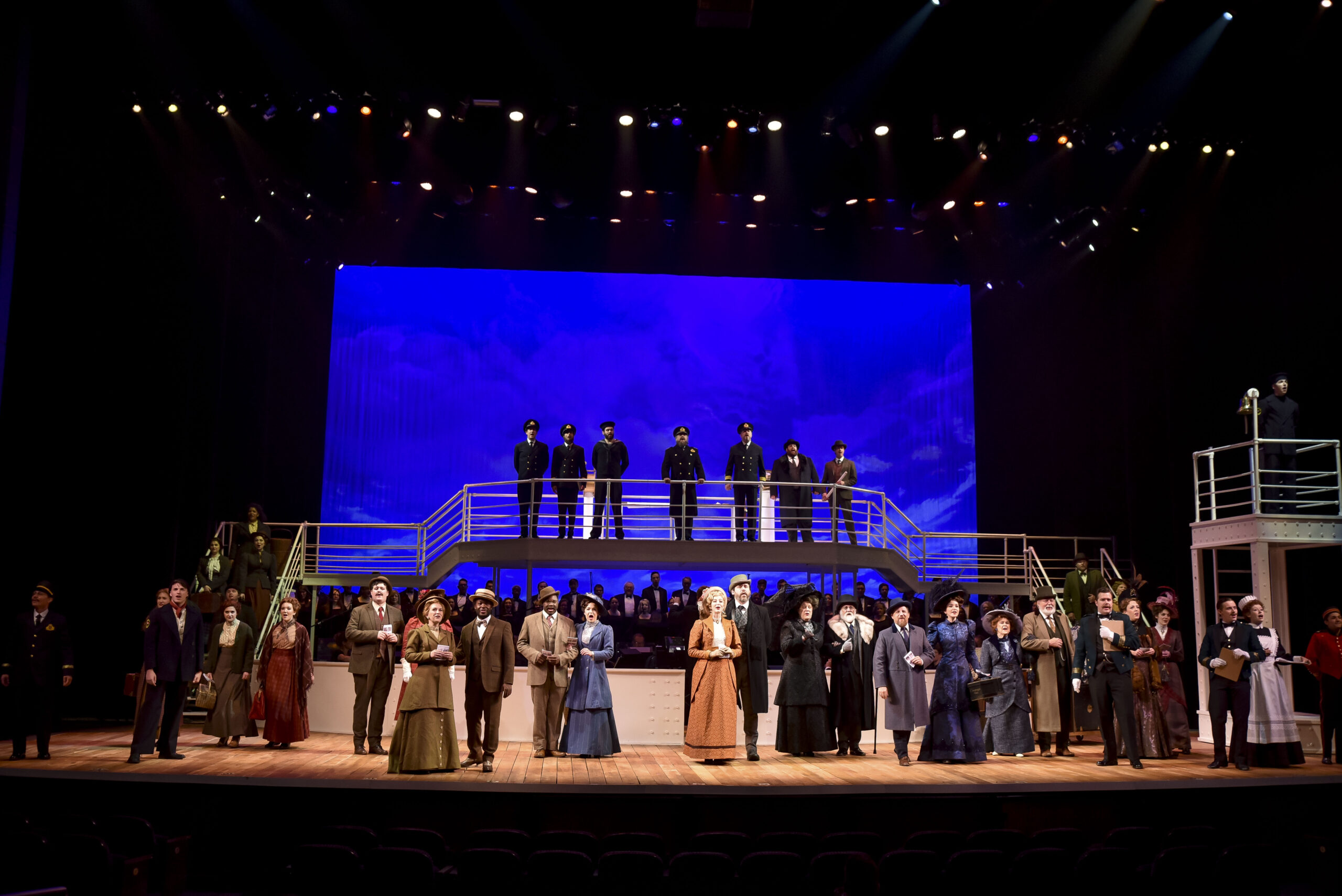“Stage managers are the unsung heroes of theatre. They should get the final bow at every show.”
– Brian T. Hamilton
If you’ve never been in a play or worked backstage, you may be unfamiliar with one of the key players in any good production: the stage manager. Maybe you’ve seen Thornton Wilder’s classic play Our Town, where a calm, collected character called “Stage Manager” walks the audience through the story. While Our Town is rightly considered one of the best American plays, the ‘Stage Manager’ in this play doesn’t dive into the full scope of responsibilities carried out by stage managers in the world today.
The UK-based Stage Managers Association puts it this way: “Like a spider sitting in the middle of its web, the stage manager or team should sit at the heart of the production and be the first port of call for anything concerning the show for all those involved in creating and running it.”
I recently sat down with three of Lyric’s go-to stage managers. These women, who collectively have worked on nearly a hundred Lyric shows, shared their stories, insights, and what they have learned along the way.
Laurena Sherrill is the Resident Production Stage Manager for Lyric at the Plaza’s mainstage season. She is also the PSM (Production Stage Manager, a/k/a head honcho) for Newsies and Titanic this summer. Laurena graduated from Oklahoma City University and has worked with Lyric for five years.
Justice von Maur is Lyric’s Resident Stage Manager for education and outreach, working primarily with Lyric’s Thelma Gaylord Academy shows. She coordinates the Interactive Program, which tours musical productions for children throughout the state of Oklahoma. Justice is a graduate of Wake Forest University (WFU) in Winston-Salem, North Carolina.
Julie Meyer is the production manager at the Dr. Phillips Center for the Performing Arts in Orlando, Florida. She comes to Oklahoma City this summer as the PSM for Singin’ in the Rain, her 19th show with Lyric. A native Oklahoman and graduate of the University of Central Oklahoma, she first stage managed for the Academy in 2006.
———————————————————————————–

Julie Meyer backstage during Lyric’s Summer at the Civic
RODNEY: How did everyone get started in stage management?
JULIE: I started as an actor. In my senior year, which should have been my final year, I pinch-hit as a stage manager for Grease at UCO, because they needed help. The theatre staff came to me and said they thought I had a natural ability and I should cultivate these tendencies. I stayed a fifth year and stage managed four or five shows–whatever they could push me into.
JUSTICE: I did not go to a school that had a big theatre program. I think they offered one class in stage management. While I was a student, they did a massive show where they brought in several guest artists. The guest director was WFU alum Michael Baron. The teachers realized I was pretty organized, I suppose, so they asked me to be the stage manager. Two years later, Michael asked me to work on Crowns and Fun Home.
RODNEY: And this summer you are assistant stage managing at the Civic.
JUSTICE: This is my first summer season at Lyric as an ASM. It’s a very different pace from what we usually do during the year, so I’m learning a lot. It’s a crash course, but I have great teachers.

Justice von Maur
RODNEY: What is the most significant difference between the Academy and summer at the Civic?
JUSTICE: Well, the casts are bigger at the Civic. There’s more dressing room, more things flying. Much bigger set pieces. We rarely have massive set pieces at the Plaza because there is little wing space. It’s a smaller scale with the Academy. For the Interactive tour, we don’t have any lights, but we have sound, so we travel with a soundboard, and everyone has their microphones. I run all of that during the shows.
LAURENA: I stumbled upon stage management. I was 14 and took a drama class because I thought it was an easy A. I was not interested in acting but loved the artistry of theatre. For this class, though, I had to audition for a show, and I bombed the audition. Our teacher, who was also the director, got us all on stage and said, “I want you to tell me what part you want in the show.” I had read the title ‘stage manager’ somewhere, and I’m a Type A personality who likes to be in charge, so I said I wanted to be this stage manager. It turned out that I was good at it. Then I got accepted to study stage management at OCU, and it turned out to be my career.
RODNEY: What makes you a good stage manager?
LAURENA: I’m approachable. And I like managing the chaos, getting artistic personalities to work together and create one concept. Because I think theatre is the most collaborative art form. It’s impossible to do theatre without collaboration. Each artistic personality has their own perception, and trying to get so many different people to have one singular show is sometimes crazy. But I love it.
RODNEY: What’s the trick to doing that?
LAURENA: Patience. Communication. And finding the joy in bringing everyone into a community. We’re serving the audience community, but each show is also a community trying to bring one story to life.

Laurena Sherrill (second from the right) and her production crew during Lyric’s WHEN WE’RE GONE 2018
RODNEY: I’ve read a lot of directing books, and they tell you that’s the director’s job–to bring all creative decisions together. But you’re absolutely right.
LAURENA: The director’s job is to have a vision. And our job is to communicate and help each department know how that vision should be executed.
JULIE: And see the bigger picture, right? We have to be able to see the forest through the trees because directors and designers are focused on how this looks — this stage picture — how it sounds, the color, the mood of the scene. We have to mitigate everybody’s ideas and artistic visions and make them merge.
LAURENA: Accommodate everyone’s wishes, desires, and artistic values.
JUSTICE: Sometimes you can’t accommodate everyone.
RODNEY: What do you do when that happens? When everybody can’t be accommodated.
JULIE: You have to make people talk, somebody has to give something up.
LAURENA: At some point, someone’s got a win. You can’t just have one person always losing — everyone has got to win at some point. So there’s a compromise. And it still all has to align with the director’s vision.
JUSTICE: That’s why some people say the theatre community is so small. It’s because people want to work with people that they know. It helps keep everyone on the same page.

Julie Meyer and Kelli O’Hara backstage at Lyric’s OKLAHOMA 2007
RODNEY: That’s got to be a challenge when you have people on the creative team that don’t see eye to eye. Why do you keep coming back to the stage manager’s table?
JULIE: If the end product is magnificent, you are willing to overlook personality differences and communication styles. It’s our job to help the team overcome friction because, in the end, the work is so good.
RODNEY: How do you do that?
JULIE: I try to defuse everything with humor. And then I force everybody to talk. Sometimes it gets uncomfortable, but it’s part of the process.
JUSTICE: Sometimes, you can anticipate what people are going to get pissed about. Honestly, being a stage manager is a lot of personality management.
JULIE: We get thrown a lot of information. Let’s say you have a director who expresses displeasure with a costume. Now you have to decide if you’re being told that as a stage manager, or as a personal friend. My question then is, have you talked to the designer? ‘No, because they really liked it.’ Then I say, you either have to stop and adjust your expectations and like this dress, or go talk to the designer. Because this type of thing only manifests negativity, even over one dress. Communication can resolve every conflict in the world: feuding countries, friends, family, and even creatives working on a musical.
LAURENA: It’s also about reading people. Like Justice said, anticipating their needs. Listening, hearing, and digesting what people want. Because you can talk and talk all you want. But if no one’s listening, and comprehending what you’re saying, you’re not going to get anywhere. If a stage manager can read people, then you can help the person next to you who does not understand because you speak their personal language.
RODNEY: Like a translator.
JULIE: I speak Michael Baron very well. I’ve worked with him for a long time, going back to Signature Theatre when he was the Associate Artistic Director. I was learning to speak Michael Baron then. Having Justice and Laurena on the team for Singin’ in the Rain is so helpful, because they are here year round, and can fill in the gaps.
LAURENA: It helps to be familiar with a director’s vernacular, and what they mean when they get certain tones. People say a lot with their body language, and once you get to know them. It takes intuition.
RODNEY: Have any of you worked together before this summer?
LAURENA: I shadowed A Little Night Music when I was 16, and Julie was the Production Stage Manager.
RODNEY: What has changed since shadowing Julie back in the day?
LAURENA: Well, everything. I could tell Julie was really professional and knew her ASMs very well. I was just so dumbstruck and mesmerized by the entire thing. At one point Julie turned around and said, “I’m sorry you came in on this show. It’s a little boring.” And this woman was calling cues left and right, and things were moving everywhere. I’d watched shows of similar production quality, but never from backstage, That was one of the pivotal moments where I said to myself, “Yeah, this is what I want to do.” I hope the people who intern with us now get that experience, as well.

Laurena Sherrill and Justice von Maur backstage at Lyric’s Summer at the Civic
RODNEY: Justice, what is your favorite part of stage management life?
JUSTICE: I like to nurture people. That’s why I like Interactive so much because I’m more than a stage manager. I’m helping people get in their dresses, and putting up tables, and giving out Advil, and getting snacks for people. Whether it’s kids or adult actors, I remind everyone when it’s time for the last bathroom break. I love being the one people can turn to.
RODNEY: You like being a full-throttle sort of stage manager.
JUSTICE: That’s the background that I come from. I grew up in the Bahamas, where I never had formal theatre in school. In college, I was doing everything in the theatre program, like a producer. From coordinating everyone’s schedule to running the sound. The large scale shows at Lyric are very different for me — they run like a machine because they have to. Every team member has very individual and specialized tasks — sometimes, that can make you feel siloed but it’s amazing that everyone is able to come together to create an amazing product at the end of the day.
RODNEY: Julie, you’ve worked at so many places and on so many kinds of shows. Can you think of one defining moment that affirmed why you fell in love with being a stage manager?
JULIE: Unequivocally. We did Billy Elliot here at Lyric in 2015. It was a huge, huge show. During tech rehearsals, many things weren’t going right. It was just a challenging process.
We got to the Angry Dance. It’s the conclusion of Act 1 where Billy finds out that his father is going back to work, and he can’t take ballet classes anymore. His teacher approaches his dad and says you have to let him go, then Dad throws down the law and says no. Billy goes freaking crazy, via dance. Meanwhile, there’s this political movement and protesters on stage, and a massive police presence. Everyone you can think of is angry all at the same time.
But it’s Billy Elliot, so there’s this 11-year-old kid on stage that we had to keep safe the entire time with all these moving parts swirling around. The Angry Dance in and of itself had something like 125 cues in five and a half minutes, which is an insane amount of cues. Before opening night, we hadn’t fully teched the Angry Dance. The lighting designer had given me the cues, and they were in the book, but there just wasn’t time to build them before the final dress rehearsal. So we knew what we wanted to happen during the scene, but none of us had ever seen them actually happen.
On opening night, we get to the end of Act 1, and we anxiously start the Angry Dance. Everything landed spot on. Boom, boom, boom, boom, boom! All 125 cues, Billy falls on the floor and blackout! The crowd goes insane. We get Billy off stage safely and bring up the house lights.
I could not contain myself. I was shaking, and the hair on my arms was standing up. Because it all happened. The way we wanted it to happen. It was magical. It’s what I imagine a heroin addict feels like to have that much adrenaline and emotion flowing.
Ashley Stover Wells, came back and she was just as overwhelmed, because it was so magnificent. I just stood in a little cubby in the hallway and sobbed. Then it was time for Act 2, and I got my s@*t together to keep going. So yeah, that was the definitive moment for me.
– Rodney Brazil, Arts Blogger
[/et_pb_text][/et_pb_column][et_pb_column type=”1_3″ _builder_version=”4.16″ custom_padding=”|||” global_colors_info=”{}” custom_padding__hover=”|||”][et_pb_sidebar orientation=”right” area=”sidebar-1″ show_border=”off” _builder_version=”4.16″ remove_border=”on” locked=”on” global_colors_info=”{}”][/et_pb_sidebar][/et_pb_column][/et_pb_row][/et_pb_section]











